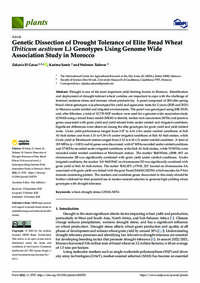Genetic Dissection of Drought Tolerance of Elite Bread Wheat (Triticum aestivum L.) Genotypes Using Genome Wide Association Study in Morocco

Authors:
Drought is one of the most important yield-limiting factors in Morocco. Identification and deployment of drought-tolerant wheat varieties are important to cope with the challenge of terminal moisture stress and increase wheat productivity. A panel composed of 200 elite spring bread wheat genotypes was phenotyped for yield and agronomic traits for 2 years (2020 and 2021) in Morocco under rainfed and irrigated environments. The panel was genotyped using 20K SNPs and, after filtration, a total of 15,735 SNP markers were used for a genome-wide association study (GWAS) using a mixed linear model (MLM) to identify marker-trait associations (MTA) and putative genes associated with grain yield and yield-related traits under rainfed and irrigated conditions. Significant differences were observed among the elite genotypes for grain yield and yield-related traits. Grain yield performance ranged from 0.97 to 6.16 t/ha under rainfed conditions at Sidi Al-Aidi station and from 3.31 to 9.38 t/h under irrigated conditions at Sidi Al-Aidi station, while Grain yield at Merchouch station ranged from 2.32 to 6.16 t/h under rainfed condition. A total of 159 MTAs (p < 0.001) and 46 genes were discovered, with 67 MTAs recorded under rainfed conditions and 37 MTAs recorded under irrigated conditions at the Sidi Al-Aidi station, while 55 MTAs were recorded under rainfed conditions at Merchouch station. The marker ‘BobWhite_c2988_493’ on chromosome 2B was significantly correlated with grain yield under rainfed conditions. Under irrigated conditions, the marker ‘AX-94653560’ on chromosome 2D was significantly correlated with grain yield at Sidi Al-Aidi station. The maker ‘RAC875_c17918_321’ located on chromosome 4A, associated with grain yield was linked with the gene TraesCS4A02G322700, which encodes for F-box domain-containing protein. The markers and candidate genes discovered in this study should be further validated for their potential use in marker-assisted selection to generate high-yielding wheat genotypes with drought tolerance
